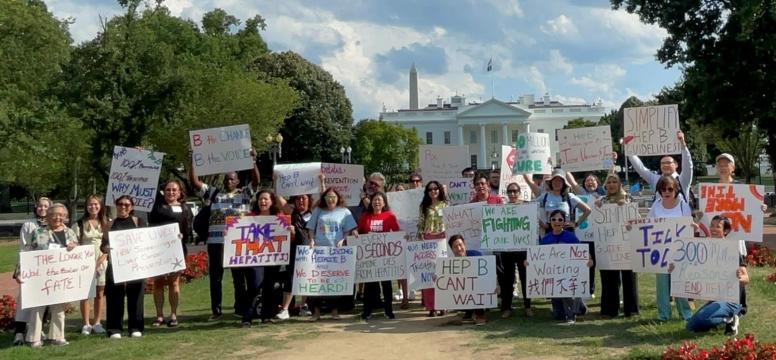National partners convene in Washington, D.C., for 11th Annual Summit.
Doylestown, Pa., July 28, 2023 – Hep B United, a national coalition established by the Hepatitis B Foundation and the Association of Asian Pacific Community Health Organizations (AAPCHO) to address the epidemic of hepatitis B, hosted its 11th annual summit in Washington, D.C., July 24-25. The summit brought together nearly 100 community leaders, advocates, clinicians, federal partners and people living with hepatitis B to discuss strategies and challenges towards eliminating hepatitis B in the U.S.
At the Summit, participants discussed innovative local and national programs to prevent, diagnose and treat hepatitis B. Discussions focused on strategies to disseminate and implement the new universal adult hepatitis B testing and vaccination recommendations, while also ensuring that we continue to work towards addressing hepatitis B and liver cancer related health disparities among disproportionately impacted communities. Summit participants identified critical needs for improving the hepatitis B care cascade in the U.S. This includes the need for point-of-care testing for hepatitis B, increased access to vaccine, capacity building and support for disseminating and publishing community-based data, and enhanced training and support for patient navigators. The Summit also featured people living with hepatitis B, to discuss the role of storytelling in increasing public awareness and combatting stigma and discrimination.

Photo by Amy Trang, PhD, MEd, Hep B United
Importantly, the Summit provided an opportunity to highlight the critical role that people with lived experience play as we strive to eliminate hepatitis B. Participants discussed a powerful new Patient Declaration published in the Journal of Viral Hepatitis by co-authors Dr. Su Wang, Director of the Center for Asian Health at Cooperman Barnabas Medical Center, and Mr. Danjuma Adda, President of the World Hepatitis Alliance.
“People living with hepatitis B deserve a voice at the table and should be included in clinical and research discussions that impact their lives,” Dr. Wang said.
Partners in the room concluded that expanded and simplified hepatitis B treatment guidelines are needed and decisionmakers must integrate patient preferences and quality of life assessment into the medical management of hepatitis B.
Aligning with the Patient Declaration, the Hepatitis B Foundation released a video to highlight some of the patients’ demands.
At the end of the two-day meeting, Hep B United partners hosted an awareness event in front of the White House, carrying signs such as “We Are Fighting 4 Our Lives” and “Hep B Can’t Wait.”
“This was an ideal way to commemorate World Hepatitis Day, and an opportunity to spotlight the needs of people living with hepatitis B, and generate action towards prioritization hepatitis B, hepatitis D and liver cancer as urgent health priorities,” stated Dr. Chari Cohen, President of the Hepatitis B Foundation.
During the Summit, HBU hosted a Community Reception, and were honored to have opening remarks made by the Honorable Hank Johnson, from Georgia’s Fourth Congressional District, co-chair of the Hepatitis Caucus, and supporter of Hep B United’s vision of a future free of hepatitis B. HBU also conferred Legacy Awards to the following people for their outstanding contributions to communities impacted by hepatitis B: Joan Block, co-founder and past Executive Director of the Hepatitis B Foundation; Cynthia Jorgensen, former Lead for Education, Communication and Training at the CDC Division of Viral Hepatitis and primary architect of the multi-lingual Know Hepatitis B campaign; and Jane Pan, former Executive Director of HBI-DC. HBU also conferred the Hep B United Congressional Champion Award to Representative Brian Fitzpatrick (PA-01).
World Hepatitis Day is observed each year on July 28. That is the birthday of Dr. Baruch Blumberg, Nobel Laureate who discovered the hepatitis B virus and developed the first vaccine.
About hepatitis B: The world’s most common serious liver infection, chronic hepatitis B, is caused by a virus that attacks and injures the liver. Almost 300 million people worldwide and 2.4 million people in the U.S. have chronic hepatitis B. Each year up to 1 million people die from hepatitis B worldwide, even though it is preventable and treatable. If untreated, hepatitis B can lead to liver cancer, which is one of the deadliest cancers worldwide.
About Hep B United: Hep B United is a nationwide coalition with partners in 37 cities, 29 states and Washington, D.C. The coalition is co-led by the Hepatitis B Foundation and the Association of Asian Pacific Community Health Organizations (AAPCHO). Hep B United is dedicated to reducing the health disparities associated with hepatitis B by building the capacity of community coalitions to increase hepatitis B education, vaccination, testing and linkage to care in a culturally and linguistically responsive manner. The coalition focuses on communities disparately impacted, including Asian Americans, Native Hawaiians and Pacific Islanders, African Immigrants and persons who inject drugs. It promotes cross-sector partnerships between community organizations, health departments and Federally Qualified Health Centers, and has been building the capacity of multi-sectoral community coalitions to address hepatitis B in a nationally coordinated manner. The Hep B United Summit is the largest convening of hepatitis B leaders from community coalitions, national nonprofit organizations, individuals and family members affected by hepatitis B, and public health agencies in the U.S.


